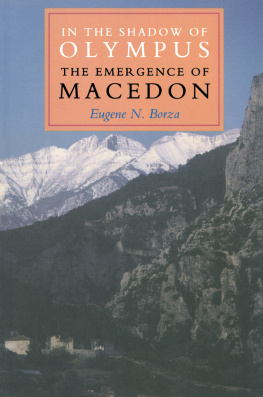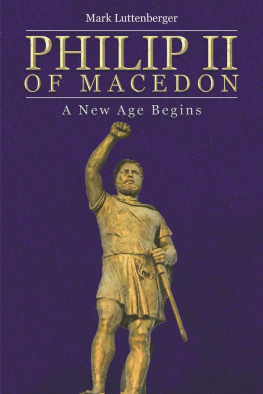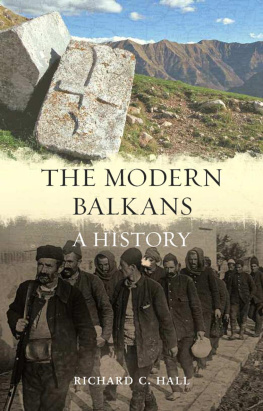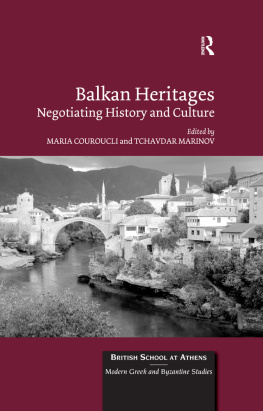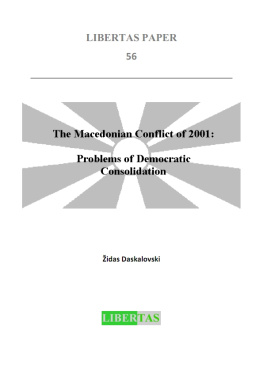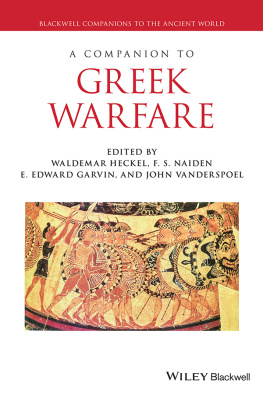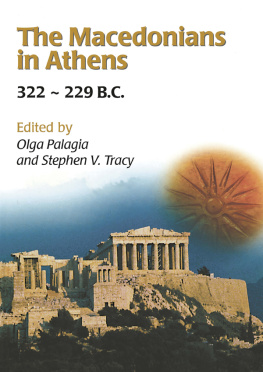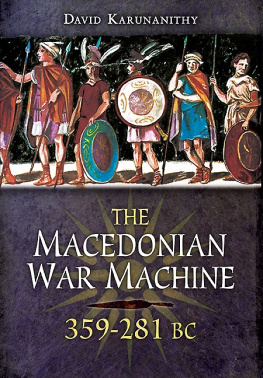
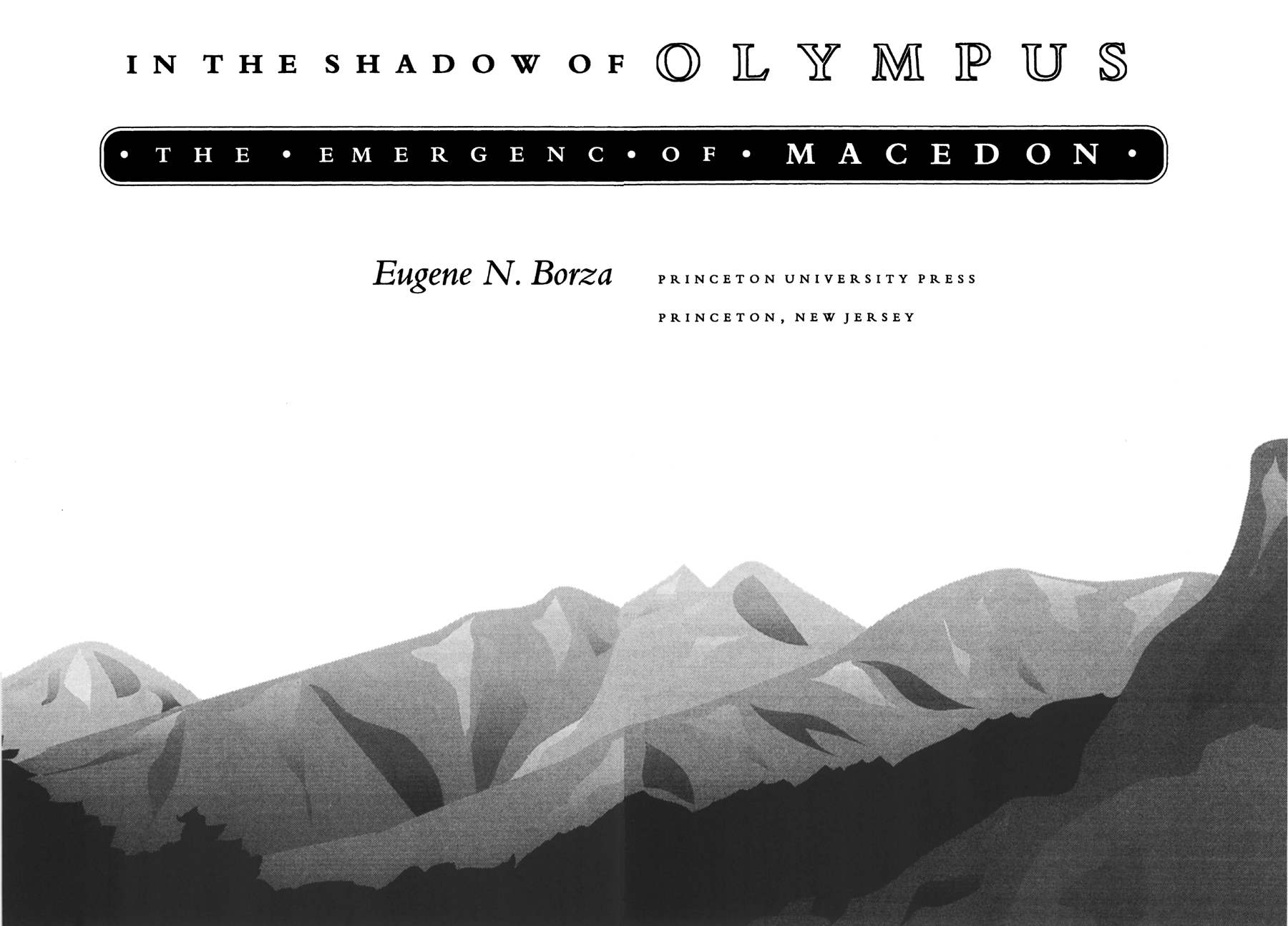
Copyright 1990 by Princeton University Press
Published by Princeton University Press, 41 William Street,
Princeton, New Jersey 08540
In the United Kingdom: Princeton University Press, Chichester, West Sussex
All Rights Reserved
Library of Congress Cataloging-in-Publication Data
Borza, Eugene N.
In the shadow of Olympus: the emergence of Macedon / Eugene N. Borza.
p. cm.
Includes bibliographical references and index.
ISBN 0-691-05549-1ISBN 0-691-00880-9 (pbk.)
I. MacedoniaHistoryTo 168 B.C. I. Title.
DF261.M2B67 1992 938.1dc20 92-7973
5 7 9 10 8 6 4
eISBN: 978-0-691-21594-5
R0

ILLUSTRATIONS
.
PREFACE
W HAT follows is an account of ancient Macedon down to the age of Philip and Alexander. It was prompted by an interest in the historical geography, historiography and emerging archaeology of Macedonia. Two factors intervened to prevent this book from extending its scope into the Hellenistic period. The first was the untimely death in 1981 of my collaborator, Harry J. Dell, who was to have undertaken the history of the Antigonids in Macedonia. Second, there have appeared recently a number of works that deal in part or in whole with Hellenistic Macedon, and the interested reader now has a variety of sound, up-to-date views to consider. Moreover, fresh archaeological evidence from the Hellenistic era, while welcome, has provided relatively fewer new insights into the period than have comparable discoveries for the fourth century B.C. And, with the continuing appearance of interpretative histories of Philip II and Alexander the Great, it has seemed best, for the moment, to concentrate on early Macedonia.
Part of this book is narrative and part is thematic. It attempts to be chronologically comprehensive down to the death of Philip II in 336 B.C. It deals with the age of Alexander the Great in limited fashion, only as part of the continuum of Macedonian institutions and cultural expressions. I hope to have shown that the emergence of Macedon as a great power in antiquity from the shadow of the Greek city-states is paralleled in our own day by an increasing appreciation of distinctive Macedonian institutions and material culture.
Inevitably this work will be comparedfor better or worsewith parts of Nicholas Hammond et al., A History of Macedonia (3 vols., Oxford: 197288). One suspects that parts of A History of Macedonia will not need revision for decades. But the very value of Hammond as a Handbuch has made it nearly inaccessible for all but the specialists, with other readers using it mainly for consultation on particular points rather than for narrative (Griffiths sections of Philip II and parts of the third volume on the Hellenistic kings excepted). Moreover, the first two volumes of Hammond were largely written by 1974, and thus could not take into account the remarkable archaeological discoveries in Macedonia since 1977. If there were no other reason to produce an up-to-date Macedonian history for the earlier period, the need to incorporate the results of recent excavations alone would suffice. I regret that I have been able to do little more than note for bibliographical purposes most work published after 1986.
It is a purpose of this volume to offer an accessible historical essay to anyone interested in the emergence of Macedon. That I do not agree with Hammonds interpretations on a number of points should not be construed as a diminution of respect for his pioneering effort. Where differences exist, they will be so indicated, and the reader is free to pursue these matters and decide between our respective views. On some issues I hope to have broken new ground, and such issues will be presented in technical detail. On others I have attempted to synthesize existing opinion without arguing each question afresh. This procedure will be especially evident in those areas in which I am not qualified as a specialist. For the obligation of the historian in such cases is to read the technical literature of the specialists who tend to write mainly for one another, and to summarize their conclusions accurately for the readers of a wide-ranging general history. The last quarter of the twentieth century has been marked by fertile scholarship in Macedonian studies, and the present work intends to reflect that.
The history of a people is never conclusively written, and this author expects that in time the present work will become obsolete, especially in light of the rapidly expanding archaeology of the Balkans. No doubt I have permitted myself more latitude of interpretation than I might have expressed in a technical journal. Even so, the reader will find the analyses cautious, perhaps too much so for some tastes. It remains for those who follow to offer other interpretations based on a more sophisticated understanding of the historical process, better historical method, and the new evidence that archaeology is certain to provide. Thus, this work is offered to those who seek some understanding in light of present knowledge, and to those who will use it to improve and refine what is set out here.
In the matter of transliteration of Greek proper names, I have, like many others before me, tried for consistency and failed. One should simply accept the injunction of two great travellers in GreeceCol. W. M. Leake and Stuart Rossiterwho, a century and a half apart, recognized that in this matter it is impossible in any manner to avoid inconsistency.
In order to forestall chaos I have adopted the following system to make things more comfortable for the reader. I have kept in their English form a number of names so common that any alteration might prove inconvenient or precious (e.g., Athens, Corinth, Alexander, Philip). Other ancient Greek names have been given in Latin forms recognizable in the Western world (e.g., Herodotus, Archelaus, Eurydice, Eordaea). Where the ancient place name is still in common use and widely known I have used its Latin form (e.g., Olympus, Boeotia, Euboea); where not so well known, a standard transliteration from the modern Greek form is employed (e.g., Axios, Thasos, Pangaion, Peneios). Modern Greek names that have little or no famous ancient heritage have been transliterated directly, preserving the pronunciation whenever possible (e.g., Veria, Kozani, Paiko, Vergina). Anomalies exist, and I hope that, like the author, the reader will not worry too much about them.
ACKNOWLEDGMENTS
I T IS a pleasure to record my thanks to a number of fellow scholars who have, over the years, shared their insights and provided information and criticism from their various disciplines: W. Lindsay Adams, Beryl Barr-Sharrar, William Biers, Judith Binder, A. B. Bosworth, Stanley M. Burstein, the late Harry J. Dell, J. R. Ellis, Ernst A. Fredricksmeyer, Paul B. Harvey, Jr., Frank L. Holt, George Huxley, Stella G. Miller, and Nancy J. Serwint.
Without the cooperation of colleagues in Greece, much of the archaeological, topographical, epigraphical, and linguistic material incorporated into this work would not have emerged into print. My Greek friends have my gratitude for helping make this an international effort: Manolis Andronikos, Kostas Buraselis, Miltiades B. Hatzopoulos, Louisa Laourdas, Dimitris Pandermalis, Photios Petsas, Katerina Rhomiopoulou, Chrysoula Saatsoglou-Paliadeli, Maria Siganidou, Yiannis Touratsoglou, and Julia Vokotopoulou.

